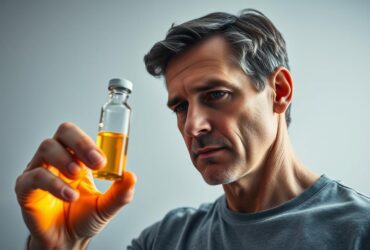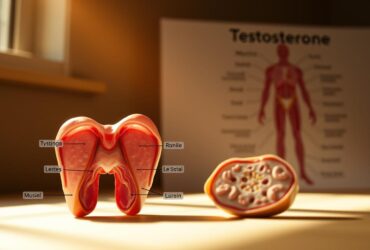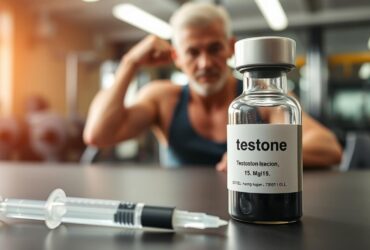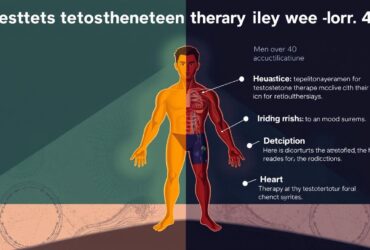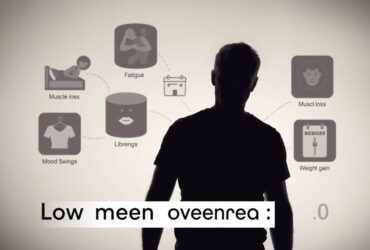Testosterone is key for men’s health. It helps with muscle, energy, and sex drive. As men get older, especially after 40, testosterone levels drop.
It’s important for men over 40 to know the signs of low testosterone. This can help them stay healthy and feel better.
The American Urology Association says low testosterone is less than 300 ng/dL. About 2.1% of men might have this issue. Younger men might see rates as low as 1%, but for men over 80, it could be up to 50%.
Being overweight or having diabetes can also raise the risk of low testosterone.
Understanding Testosterone and Its Role in Men’s Health
Testosterone is the main male sex hormone, made in the testicles. It’s key for sexual growth, making sperm, keeping muscles, bones strong, and mood. As men get older, their testosterone levels drop, often starting in their 30s or 40s. Knowing how testosterone affects men’s health is vital for staying well.
What is Testosterone?
Testosterone is a steroid hormone vital for the male reproductive system. It helps men grow facial hair, build muscle, and have a deeper voice. It also helps make red blood cells, keeps bones strong, and boosts energy.
Normal Testosterone Levels by Age
The American Urology Association says low testosterone is under 300 ng/dL. But, normal levels change with age. They peak in early adulthood and then slowly drop, about 1% each year after 30 or 40.
Key Functions in the Male Body
- Sexual development and function
- Sperm production
- Muscle mass maintenance
- Bone density
- Mood regulation
- Energy production
Keeping hormone imbalance in men and testosterone levels healthy is key for men’s health. Understanding testosterone’s role and how it changes helps men stay physically and mentally fit.
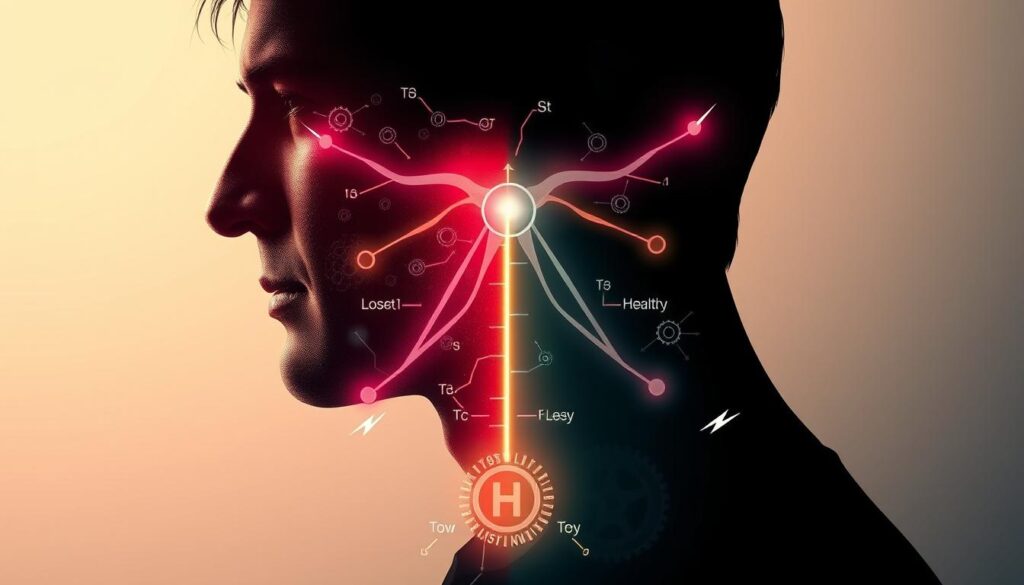
Signs of Low Testosterone
Changes in your body, sex life, and mind as you get older might mean you have low testosterone. Hormone imbalance in men is common and affects health and happiness. Knowing the low testosterone symptoms helps you act fast to feel better.
A drop in sex drive and performance is a clear sign of low testosterone. About 2 out of 10 men see their libido decrease due to hormones. Also, erectile dysfunction often comes from low testosterone.
Feeling tired and lacking energy is common, with 1 out of 10 men noticing it. Many men also have trouble focusing and remembering things, affecting about 3 out of 10.
Less muscle and strength are signs of low testosterone. This can change how you look and how well you exercise, impacting about 5 out of 10 men.
Unexplained weight gain, especially around the belly, is a sign of low testosterone, affecting about 6 out of 10 men. Losing body hair, like facial and pubic hair, is another sign, affecting about 7 out of 10 men.
Osteoporosis, weak bones, is linked to low testosterone in men, though the exact rate is not known. Sleep problems, like insomnia, can also be related to hormonal imbalances.
Low testosterone affects more than just your body. It can also impact your mood, focus, and energy at work. This can make it hard to do your job well.
Remember, low testosterone is common in men over 40. As testosterone levels drop with age, recognizing the signs and acting on them is key to staying healthy and happy.
Physical Changes and Body Composition
Low testosterone in men can cause big changes in the body. It can make muscles smaller and weaker. This makes it harder to do everyday things.
Men with low testosterone also gain more body fat, especially around the belly. This can increase the risk of heart disease and other health problems. They might also lose bone density, which can lead to osteoporosis and broken bones.
Muscle Mass Reduction
Testosterone is key for building and keeping muscle. When it goes down, men lose muscle and strength. This makes it tough to stay active and do things they used to do easily.
Increased Body Fat Distribution
With lower testosterone, men’s bodies store more fat around the belly. This can raise the risk of heart disease, diabetes, and other metabolic issues. It’s harder to keep a healthy weight and body shape when testosterone is low.
Changes in Bone Density
Testosterone helps keep bones strong. When it drops, bones can become weaker. This increases the risk of osteoporosis and fractures. It can affect how well men move and live independently, especially as they get older.
| Condition | Prevalence | Impact |
|---|---|---|
| Muscle Mass Reduction | Common in men with low testosterone | Decreased physical fitness and ability to perform daily tasks |
| Increased Body Fat Distribution | Frequently observed in men with low testosterone | Increased risk of cardiovascular diseases and metabolic disorders |
| Decreased Bone Density | Significant risk factor for men with low testosterone | Heightened susceptibility to osteoporosis and fractures |
Sexual Health and Performance Impact
Low testosterone levels can greatly affect a man’s sexual health and performance. Men with low testosterone may feel less interested in sex. This can harm their relationships and overall happiness.
Erectile dysfunction is also common. It’s often due to lower sex drive, less physical activity, and less satisfaction in sex.
These issues can make men feel stressed and lower their self-esteem. This can hurt their overall well-being. Studies show a strong link between testosterone levels and sex desire in aging men. Low sex desire is a key issue in men with hypogonadism and sexual problems.
But, there’s good news. Research shows that testosterone replacement therapy (TRT) can help improve sexual function. This is especially true for middle-aged and older men with low testosterone.
However, it’s important to remember that TRT’s role is small and varies a lot. Lifestyle changes can also lead to similar improvements. So, combining PDE5i with lifestyle changes is often the best first step for treating erectile dysfunction, even in men with mild testosterone deficiency.




